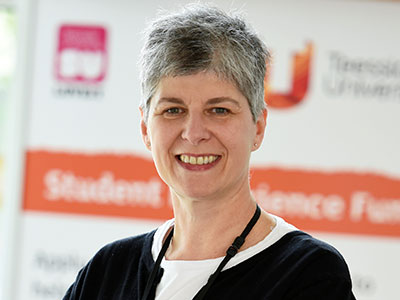Course overview
The learning and teaching strategy of the course encourages an individualised and progressive acquisition of knowledge and skills required for postgraduate study. Learning is scaffolded by moving from study methods that have a greater degree of support and guidance gradually towards more independence and self-direction. You are supported to choose an area of education that is relevant to your own current or future professional practice which can form the focus of your learning.
Within each module you focus on an area of education that is particularly relevant and useful to your future career. Previous students have focussed on exploring teaching phonics, developing enhanced support for students with learning needs in tertiary education, exploring how social interactions can be used to develop teacher-child relationships, looking at the efficacy of the use of tools with non-verbal children, how to enhance teaching of maths and literacy at a range of levels.
Top reasons to study this course
> Study this course and you may be eligible for a £2,500 Sir Keith Skeoch postgraduate scholarship.
> The teaching team of knowledgeable and experienced staff support you to develop your teaching practice, and your share your learning journey with mentors and peers from diverse backgrounds.
> You matter – and will be part of a community which encourages you to find your voice, with professional and personal supervision, and support specific to your needs.
Course details
Course structure
Core modules
Combining Professional and Academic Practice
You explore the role of professionalism in education. Through the problematisation of an educational issue of relevance to you, negotiated with the tutor, you will apply learning from contemporary academic theory and research to consider how the application of alternative approaches to the issue can enhance practice.
You explore contemporary education debates, examine the wider context of current education provision, and explore how this impacts on practice. You consider the relationship between ideas and processes in education, both nationally and internationally.
Educational Research: Practice and Planning
You gain an in-depth understanding of research methods in education, and the knowledge and skills required to develop an independent research study into an area of education which you conduct for your dissertation. The selection of research area and the method of enquiry will be decided in consultation with the module tutors.
You combine and enhance the skills and knowledge you have developed through other modules on this course. You work with an allocated supervisor to complete an independent research project in an area of professional education practice. You demonstrate your knowledge and skills in education research in the production of a research dissertation
Using the Literature to Inform Educational Research
You have the opportunity to develop the knowledge, skills and understanding necessary to undertake a literature search and plan an appropriate literature review, and to begin to develop your understanding of relevant contemporary research and possible gaps in knowledge.
Modules offered may vary.
How you learn
You are encouraged to share your experiences and perspectives on aspects of practice within taught sessions and through discussions on the University’s virtual learning environment. You study with students from a variety of educational settings and backgrounds – this sharing gives you the opportunity to develop a systematic and critical understanding of the breadth and depth of knowledge in educational research and practice. Peer-led discussions in workshop and seminar sessions on a range of research and educational practice issues, both home and international, provide you with the opportunity for interprofessional discussion and debate. You consider relevant issues from the perspective of other professional educational groups which, in turn, supports you to integrate and synthesise a diverse range of knowledge. If you are not a practitioner, you have the opportunity for shared learning and peer support with experienced practitioners. Some of the modules share taught sessions with the Education Doctorate, enhancing the range and type of discussions held within your sessions as well as encouraging you to consider your progression after the programme.
How you are assessed
Staff have a wide range of educational backgrounds and specialist interests to support for your cross-disciplinary interests and multi-agency working. Another important element is how we support your transition to studying at level 7. You are offered academic support to help you understand the requirements of master’s level study; to develop your skills in academic writing and referencing, critical thinking and critical writing; and in the key IT skills such as literature searching. The assessment allows you to reflect on your own practice and context, and produce assessed work that benefits your working context. Student feedback on the programme has consistently highlighted the level of support from the staff as a major contributor to their success.
Entry requirements
Standard Postgraduate criteria will apply, plus:
In exceptional cases applicants who can demonstrate suitable significant experience and/or further study in the education discipline may be considered for the course and may be asked to attend an informal interview to assess their suitability. This will include intellectual and academic suitability for the course.
A written record of the informal interview will be kept
IELTS requirement average of 6.5 with at least 5.5 in all components.
For general information please see our overview of entry requirements
International applicants can find out what qualifications they need by visiting Your Country
Information for international applicants
Qualifications
International applicants - find out what qualifications you need by selecting your country below.
Select your country:
Useful information
Visit our international pages for useful information for non-UK students and applicants.


